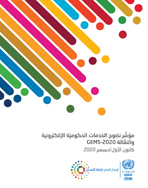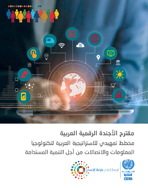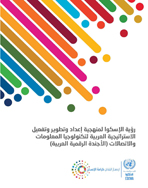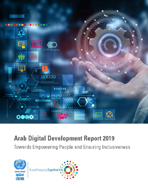Information Society and Digital Economy

The 21st century has come to be synonymous with the concept of the information or knowledge society. Smart technology is already transforming that idea into one of the smart society. Knowledge that takes local conditions and culture into account can contribute to socioeconomic productivity and performance. Through the knowledge society, we strive to underpin social security, quality of life, higher standards of living, education and culture.
Policy support, capacity-building and training
The Academy of ICT Essentials for Government Leaders in the ESCWA Region (AIGLE, http://escwa-aigle.org/) project aims to build ICT capacity among government officials in the Arab region and to enhance their skills in planning, managing and funding development projects. Inspired by a similar project launched in 2008 by the Asian and Pacific Training Centre for Information and Communication Technology for Development (APCICT; www.unapcict.org/academy), the project includes training modules on: (1) the links between ICT and development; (2) ICT4D policy, process and governance; (3) e-Government/e-governance: strategies, policies and applications; and (4) Internet governance.
In 2015, two regional training workshops were held in Beirut, in June and August, during which around 100 experts from 15 Arab countries were trained to be instructors on the Academy modules. Fourteen national training plans were launched in the participating countries. As a result, more than 6000 government officials were expected to be trained.
WSIS process
Aside from its biennial information society profiling exercise, ESCWA organizes related events
and participates in the Report of the Commission on Science and Technology for Development (CSTD), which monitors progress in the implementation of the outcome of WSIS. For example, ESCWA organized a thematic workshop on the Information Society in the Arab Region – A Decade of Achievements as part of the WSIS+10 High-level Event (HLE) in Geneva in June 2014.
Internet Governance Process
ESCWA has been involved in the Internet Governance Forum since 2006 and has made several contributions, including: (a) the Internet Governance: Challenges and Opportunities for the ESCWA Member Countries study; (b) the launch, in cooperation with the League of Arab States, of the Arab Internet Governance Forum (IGF) process, a key component of which is the Arab IGF Multistakeholder Advisory Group (AMAG); and (c) the organization of side-events and workshops at annual IGF meetings. At the most recent such meeting in 2015, ESCWA hosted two workshops: The Future of the Global and Regional IGFs Post 2015, and Emerging Issues from the Arab Internet Community Perspective.
Internet domain names
Since 2003, ESCWA and the League of Arab States have spearheaded Internet governance initiatives with the Arabic Domain Names System (ADNS, see E/ESCWA/ICTD/2011/Brochure.1) and Internet governance roadmap (E/ESCWA/ICTD/2010/Technical Paper.5), which together led to the establishment of the Arab IGF process.
One of the goals of ESCWA is to promote Arab identity in cyberspace through the use of Arabic in top-level domains (TLDs) of Internet addresses as part of the global Internationalized Domain Names (IDN) programme. Internet domain names that are representative of the Arab region in terms of content and language will help to bridge the digital divide.
The generic TLDs programme, launched by the Internet Corporation for Assigned Names and Numbers (ICANN), allows the introduction of new Internet names at the gTLD level using any language character. ESCWA has worked to support the acquisition of the Arab TLD “.arab” and its IDN equivalent in Arabic by the League of Arab States, the formation of the associated Arab TLDs Registry, and the use of country code TLDs (ccTLDs) in IDN format for the Arab countries. Currently, 13 Arab countries have registered ccTLDs in Arabic.
ICT for socioeconomic development
Economic success and social development have become increasingly dependent on access to information and technology. The use of ICT has nurtured the rise of e-services in communication, trade, employment, education, government and health. Curiously, the impact of ICT on development has yet to be studied in depth. ESCWA has therefore focused in recent years on assisting member countries with the formulation of ICT strategies and programmes that foster socioeconomic development. Three studies should be highlighted: Impact of Selected e-Services on Socioeconomic Development in the Arab Region; Impact of ICT on Arab Youth: Employment, Education and Social Change, and Impact of ICT on Community Development in ESCWA Member Countries. For more information, visit the ESCWA information society portal at:
Peaceful use of outer space
ESCWA is taking the lead in determining priorities for the region in terms of space and satellite technologies (SSTs), in particular on how they can be harnessed for sustainable development.









